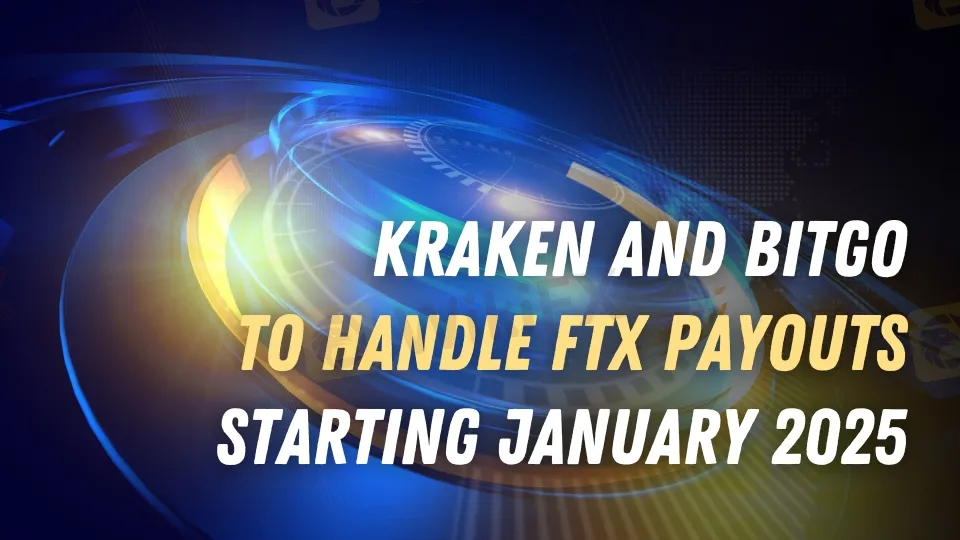简体中文
繁體中文
English
Pусский
日本語
ภาษาไทย
Tiếng Việt
Bahasa Indonesia
Español
हिन्दी
Filippiiniläinen
Français
Deutsch
Português
Türkçe
한국어
العربية
Kraken and BitGo to Handle FTX Payouts Starting January 2025
Abstract:Kraken and BitGo will oversee the first FTX payouts starting January 3, 2025. 98% of creditors receive at least 118% of their claims in cash.

The FTX bankruptcy estate has officially updated its timeline for creditor and customer repayments, with initial payouts slated to begin on January 3, 2025. This marks a major step in the long-awaited reimbursement process for users impacted by the collapse of the crypto exchange.
Under the new plan, crypto firms Kraken and BitGo will oversee the initial distribution of funds, ensuring a streamlined payout process. The first group of claim holders is expected to receive their repayments within 60 days of the effective date. For other customer groups still awaiting funds, additional announcements will provide clarity in the coming months.
“We are well positioned to begin executing the distribution of recoveries back to all customers and creditors, and encourage customers to complete the necessary steps to begin receiving distributions in a timely manner,” said FTX CEO John J. Ray III.
98% of Creditors to Receive Full Claim Value
The updated plan has garnered significant support among creditors, with 98% expected to receive at least 118% of their claim value in cash. Notably, approximately 94% of creditors in the “dot com customer entitlement claims” class – representing a staggering $6.83 billion in claims – voted in favor of the reorganization.
U.S. Judge Dorsey, who approved the plan in October, praised the process, calling it a “model case” for handling complex Chapter 11 bankruptcies.

Criticism Over Outdated Crypto Valuation
Despite broad approval, the payout plan has faced criticism from some creditors. The primary issue stems from the use of digital asset prices at the time of the creditor petition in 2022, which were significantly lower than todays values. For example, Bitcoin was valued at $16,000 when the petition was filed, compared to nearly $106,000 in 2024.
While some creditors pushed for payouts based on current crypto prices, David Adler, a lawyer representing affected parties, pointed out that FTX lacked the cryptocurrency reserves necessary to distribute funds in kind.
Lawsuits and Legal Fallout
In parallel with the payout plan, the FTX bankruptcy estate has launched a series of lawsuits targeting exchanges and individuals linked to the platforms collapse. High-profile cases include:
- A $50 million claim against KuCoin
- An $11 million suit against Crypto.com
- A $100 million complaint against Anthony Scaramuccis SkyBridge Capital over questionable deals with former FTX CEO Sam Bankman-Fried.
Additionally, Binance and its founder Changpeng Zhao are facing a massive $1.8 billion lawsuit, with allegations that Binance received $1.76 billion in fraudulent transfers prior to FTXs collapse in 2022.
Abandoned Plans for FTX 2.0
While discussions surrounding an FTX 2.0 reboot briefly emerged, the idea was ultimately shelved. Reports revealed that no investors were willing to commit the capital required to revive the platform.
As for former FTX CEO Sam Bankman-Fried, he was found guilty of fraud in November 2023 and sentenced to 25 years in prison.
Final Thoughts
The start of FTX‘s payout process in early 2025 offers a long-awaited resolution for the platform’s customers and creditors. With Kraken and BitGo at the helm, the process promises to be efficient and transparent. While some frustrations remain over outdated valuations, the 118% recovery rate provides a silver lining for most claimants. However, the ongoing lawsuits and the absence of an FTX 2.0 relaunch underscore the profound and lasting impact of one of cryptos most notorious collapses.

Disclaimer:
The views in this article only represent the author's personal views, and do not constitute investment advice on this platform. This platform does not guarantee the accuracy, completeness and timeliness of the information in the article, and will not be liable for any loss caused by the use of or reliance on the information in the article.
Read more

Why More People Are Trading Online Today?
Discover why online trading is booming with tech, AI, and a push for financial freedom. From stocks to crypto, it’s a thrilling hustle for all.

SEC Ends Crypto.com Probe, No Action Taken by Regulator
The SEC has closed its investigation into Crypto.com with no action taken. Crypto.com celebrates regulatory clarity and renewed momentum for the crypto industry.

Interactive Brokers Expands Crypto Trading with Solana, XRP, Cardano, and Dogecoin
Interactive Brokers adds Solana, XRP, Cardano, and Dogecoin to its platform, enabling U.S. and U.K. clients to trade crypto 24/7 with low fees.

Fidelity Investments Explores Stablecoin Innovation in Digital Assets Sector
Fidelity Investments tests a stablecoin, joining major financial firms in the booming crypto sector. Discover how this impacts digital payments and blockchain adoption.
WikiFX Broker
Latest News
Why Are Financial Firms Adopting Stablecoins to Enhance Services and Stability?
Experienced Forex Traders Usually Do This Before Making a Lot of Money
Octa vs XM:Face-Off: A Detailed Comparison
When High Returns Go Wrong: How a Finance Manager Lost RM364,000
Bridging Trust, Exploring Best—WikiEXPO Hong Kong 2025 Wraps Up Spectacularly
Interactive Brokers Expands Crypto Trading with Solana, XRP, Cardano, and Dogecoin
Fidelity Investments Explores Stablecoin Innovation in Digital Assets Sector
Why More People Are Trading Online Today?
SEC Ends Crypto.com Probe, No Action Taken by Regulator
Broker Comparison: FXTM vs XM
Currency Calculator







